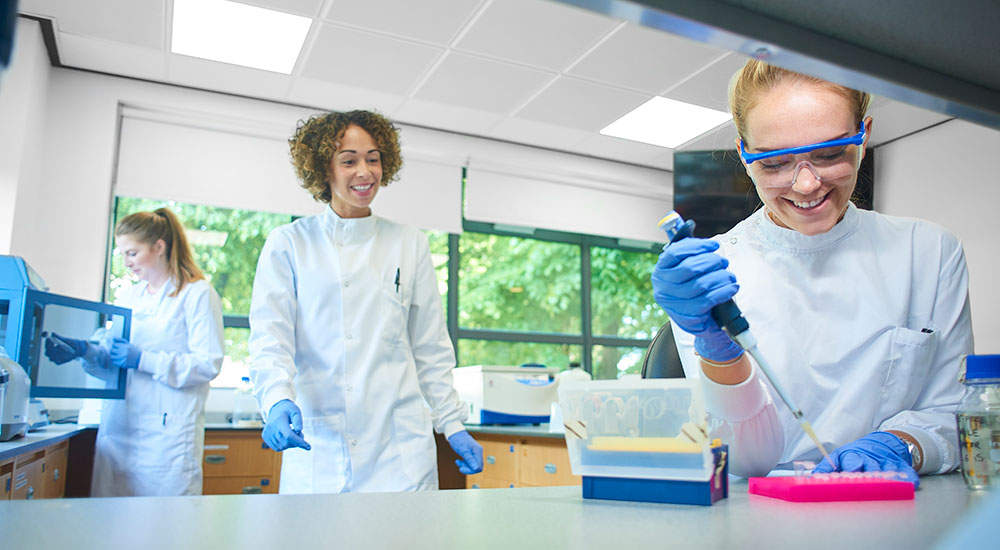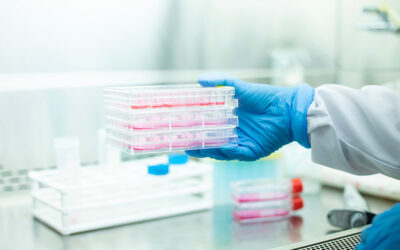As a microbiology student, you have a passion for understanding the microscopic organisms that live on, in, and all around us. Even though you love your field of study, leaving school and starting your career can be intimidating.
So, what can you do to be successful? We asked our followers and employees to share some advice with the future generation of laboratorians about to step into real-world labs. Here’s what they said:
1. Master the basics.
To be an effective microbiologist, you must become proficient in the fundamentals. As one of our LinkedIn followers put it, “A microbiology aspirant should be dedicated to the course. Spending your free time in labs and mastering basic techniques is important.”
9 Gram Staining Best Practices
Working in a laboratory also means being accountable. One of our Clinical QC Technologists shared this reminder, “Get in the habit of recording and logging everything.”
2. For students just starting out, choose your university wisely.
Find a university that offers the program and courses you need to succeed. Our Molecular Research and Development Technician shared this advice, “Make sure it’s a good university for the specific area you’re interested in studying. Maintain a good relationship with professors as they can be essential in getting a job upon degree completion.”
3. Work experience is important.
Taking on a part-time job or internship is a smart move that will prepare you for a full-time position. Our Quality Control Manager shared this advice, “If you haven’t had a job throughout high school or college, go and get one. It doesn’t matter what it is – just get used to working and not being a student. This will help tremendously as you transition from a student to the work force. It will also look good on your résumé.”
Our Molecular Research and Development Technician agreed, “My advice would be start with an internship before finishing school. It’s a great way to get an idea if lab work is actually a good fit or not without fully committing to a career in it.”
Any laboratory experience is valuable, even if it’s not in your exact area of focus. Our Industrial Quality Control Technician explained why, “Try and get an internship where you can get lab experience OUTSIDE of college labs. Many places hiring microbiology students want them to have prior lab experience outside of school. You can get college credit for an internship which not only helps you graduate, but it also gives outside lab experience, the ability to network, and you might even snag a job where you interned! Even if that internship is performing lab work for a veterinarian facility, water testing for the DNR, a hospital, a dairy operation, or even at a feed testing lab for cattle. All of these places lead to experiences in testing, record keeping, multi-tasking, streaking skills, and more!”
4. When it comes to your career path, don’t be afraid to think outside the laboratory.
Working in a laboratory everyday isn’t right for everyone. You may love microbiology but don’t want to live the lab-life, and that’s OK. Your career options are boundless if you think creatively and seize opportunities outside the laboratory.
Our Quality Control Manager gave this advice, “Educate yourself on what careers are out there. Ask your friends, family, or professors if they know anyone in the biotech industries you can talk with to determine if that is the route you want to take. Make sure you are pursuing the right degree. You may have to change it or even look into a different school if they do not offer what you want. The sky is the limit! Many employers will accept applications from graduates with any degree subject, so don’t restrict yourself. If a job looks interesting, apply for it!”
Many employees at Microbiologics started in the laboratory and moved to positions on the business side including our Industrial Market Manager, “I have found that having laboratory skills along with business knowledge is a very unique skill set. Every company that has a microbiology laboratory is making or testing some type of product and has a business pipeline with additional career opportunities. If you are interested in science but don’t want to work in the laboratory forever, know that there are opportunities outside of the laboratory as well. A double major in science and business or a B.S. coupled with an MBA would be ideal if you would like to have additional opportunities outside the laboratory working for a scientific company.”
14 Career Paths for Microbiologists
If you want to stay in laboratory setting, it’s wise to keep your options open. Here’s how one of our Twitter followers put it, “Microbiology is a HUGE field covering everything from infectious disease to bioremediation! Take your time to figure out what aspects of microbiology you like and then move forward from there.”
Career paths can take unexpected twist and turns. We recommend being open to the opportunities life presents to you. Here’s an example from our Research Technician, “As a professionally trained toxicologist working in a microbiology lab, I found that even though I was not specifically trained for a microbiology lab, the experience I gained as an undergraduate and graduate researcher were what really applied to the job. I think students training to work in a microbiology lab might be surprised by where they end up in life after college and should remember not to box themselves in when applying for jobs. Please take the time to really develop your CV and be sure to list not only your lab-based skills, but highlight soft skills as well.”
5. Working in research is fun, challenging, and often frustrating.
If you plan to work in research, take this advice from our Molecular Research and Development Technician, “In research you need to learn to deal with disappointment or success measured in tiny baby steps. In my experience, research is basically figuring out 9000 ways that something doesn’t work. It can be a very hard pill to swallow without the right personality.”
Our Research Technician agreed, “You will absolutely, 100%, feel like the course work you completed in college did not fully prepare you for working in a “real” lab, but you need to remember that the basic skills and knowledge are what is applicable and most important when starting any career. Also, lab work inherently comes with a lot of uncertainty, so as you progress through your research career, do not be overwhelmed by the uncertainty, instead use it to your advantage and seek out moments of serendipity, as this is where growth, exploration, and the fun really begins!”
6. Finding a job can be difficult. Demonstrating to an employer that you’re a well-rounded candidate it a big plus.
Our Research Technician said it best, “I would advise students preparing for a career in microbiology to really broaden their horizons when it comes to picking college courses. Do not simply take what is required or what is easy. I would highly suggest adding as many courses that include labs into your schedule as possible, as this is the best representation of what you are going to experience in a real-world working situation. Also, seek out as many intern and undergraduate research positions that you can find, even if it is not specifically related to microbiology. Look for professional development opportunities such as presenting your research at professional conferences or student research colloquiums. Also, write research proposals or grants seeking out funding, as these show employers that you are well-rounded and have experience outside of the classroom.”
For one of our LinkedIn followers who struggled to start his microbiology career in Nigeria, persistence and a positive outlook paid off, “When I graduated, I thought I was mistaken studying microbiology in Nigeria. We have limited space in the industry. You will hardly find up to two microbiologists in a multinational company. Most end up being a secondary school teacher. So, what happened to that dream of becoming a microbiologist/quality control and assurance officer in a multinational company? Will it end as just mere wishful thinking? Fifteen students graduated from the department in my set and none of them is practicing as a scientist. I thought of going to another field when I became frustrated. Then, I was privileged to secure a job in a public analyst laboratory. Here I can see where I am heading in my career to become a licensed public analyst, get a master’s degree, perfect my laboratory/practical skills and establish my own laboratory.”
7. Microbiologists are held accountable for their results. Don’t forget the importance of QC.
As quality control (QC) experts, we understand the vital role QC plays in every laboratory. One of our Twitter followers made this astute observation, “My advice would be to always make sure you are upholding quality control during every step of your process, whether it’s maintaining control cultures or ensuring traceability of data. One of the most important aspects of a job in microbiology is accounting for these processes.”
8. Understand the industry you work in and how consumers and patients are impacted by your actions.
One of our Twitter followers highlighted the importance of keeping up with the regulations in an industry, “In regulated industries, you must learn those regulations. For example, pharmaceutical microbiologists must learn good manufacturing practices (GMPs). Most of all, learn the basics. All the advanced stuff is useless if you don’t know difference between GPC and GNR.”
A follower on LinkedIn shared insights on how your work as a microbiologist impacts others, “Working in the lab needs someone with the passion for microbiology and an understanding of the technical side – why we do tests and how to maintain quality standards. One needs an open mindset as to the impact microbiology has on consumers. Microbiologists need the passion to empower others and to always find solutions that are beneficial to the world.”
9. Always remember, microbiology is awesome!
Take it from one of our most experienced Quality Control Technicians, “Microorganisms are alive and ever changing, keeping things interesting. There is always something new to discover and learn!”
What advice do you have for microbiology students? Share you words of wisdom in the comments section below.






so nice and and encouraging….
Is a very nice encouraging , I love that ,
Thank you for sharing this useful tips for students which will be helpful who wants to make their best career.
This is indeed a good words of advice for a Microbiologist aspirant. thanks.
Such A Great Blog. Thank U For Sharing Useful Information About Pursuing a Career in Microbiology. This Article Really Amzing And So Much Helpful For Me. Keep It Up:).
I’m glad you mentioned getting laboratory experience as a microbiology student can allow for networking. My brother is thinking about pursuing microbiology in college and is worried about getting enough hours in labs. He should look for internships outside of college labs for a better experience.
Very awesome and inspiring very usefull knowledge
This is very much encouraging
Good strategy
This is encouraging,it really increased my spirit whenever I think of microbiology my heart skip .How can I get an internship in Nigeria
Wow thanks very much for this enlightenment. Am so loved and happy to read and to practice on this tips
Superb